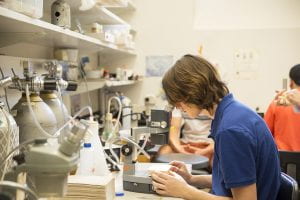There comes a time for many individuals when returning to school becomes a natural next step on a career path. However for teachers, the high demands of the school year and their unique work schedule can make finding the right program difficult.
For Nhan Pham, a biology teacher at St. Louis University High School, the time came in the summer of 2012.
“The main reason for me to do the program was that I wanted to go back to school and learn the latest research,†Pham said. “Then, I could use that knowledge to make biology more relevant to my students.”
Biology is always changing and evolving. With new discoveries come new information that can radically change what is taught in the K-12 classroom. To gain this new content knowledge, Pham chose the Master of Science in Biology program in University College at Washington University in St. Louis.
“It was intense,†Pham said. “We learned so much that I wished I had two weeks to process the things I learned even in the first day.â€
The two-year program brings educators from across the country on campus each summer for a three-week intensive, covering three different topics. Then during the school year, teachers return to their hometowns to implement what they’ve learned in the classroom while participating in online classes. In the summer of 2012, Nhan began his first week of the program at WashU’s Tyson Research Center with professor Tiffany Knight.
“I remember the first day Tiffany Knight asked us what we knew about ecology,†Pham said. After the group gave a few responses, Pham said that Knight responded that what they were teaching was actually 1950’s ecology and that she hoped by the end of the week they would see that ecology was a sophisticated and living topic that was constantly evolving.
“I was in disbelief of how much she taught us in just one week,†Pham said.
That first course on ecology had a profound impact on Pham as a teacher. “Prior to taking that course, I didn’t teach ecology to my AP students at all,†Pham said. “Ecology used to be just a summer reading packet.â€
Looking at ecology through the lenses of population ecology, statistics and invasive species gave Pham a different perspective. The following year, he traded in his summer reading packet for an entire unit on the topic.
“After I took that ecology class, I said, ‘I am going to teach ecology to my AP students, and I’m going to teach it in a fresh, new way,’†Pham said.
Ecology wasn’t the only impact that the program had on his students. His time spent at WashU allowed him to expand his network, forging many connections with both educators from across the country and faculty at the university.
“I keep in touch with a couple of classmates pretty extensively to exchange ideas and to ask for feedback,†Pham said, especially one classmate currently teaching in California. “He is a veteran (teacher), and he is really good about attending the National Science Teacher Associate and National Association of Biology Teachers events, so he always has fresh and new ideas coming back from conferences and workshops.â€

In addition to his classmates, Pham stays connected with several professors, both from within and outside of the program. Sarah Elgin, the Viktor Hamburger Professor in Arts & Sciences, and Dr. Gautam Dantas, associate professor of pathology and immunology at WashU’s Medical School, have both offered their expertise and even opened their laboratories to his students.
One visit in particular to Dr. Dantas’s lab had a lasting impact on a senior in Pham’s AP Biology class at St. Louis University High School. “He liked the visit so much that he contacted Dr. Dantas,†Pham said.
From there doors began to open. The connection led to an internship opportunity in Dr. Dantas’s lab for the summer. Through the internship, the student gained several months of hands-on medical research experience and contributed to a paper submitted to a national science publication. The following fall, the student attended the University of Missouri – Kansas City for a six-year, combined B.A/M.D. program.
“Students tell me that they truly enjoy those types of experiences,†Pham said of the chance to visit different professors’ laboratories. “They get to see real scientists doing real stuff, and the stuff that (WashU) scientists are doing is really cutting-edge.â€
Due to the innovative content and opportunities to build a professional network, Pham said that for anyone interested in the MS in Biology program, he would strongly encourage participating.
“The program is well worth someone’s time,†Pham said. “It’s really intense… but definitely worth the investment.â€
For more information on the Master of Science in Biology program for educators, click here.
Sign up for our newsletter.
